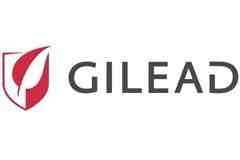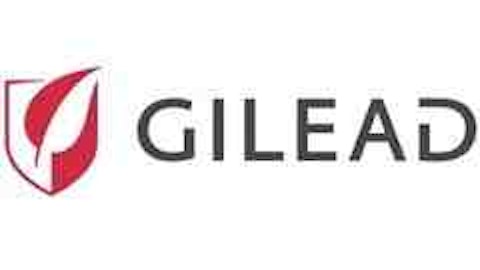Investing in biotech companies can be risky; developing new drugs is a long, expensive, and uncertain process, and there is always considerable regulatory risk in the industry. When it comes to Gilead Sciences, Inc. (NASDAQ:GILD), however, its dominant position in HIV treatment and the company’s growth prospects make it look like a long term winner.
Leadership
Gilead Sciences, Inc. (NASDAQ:GILD) is the undisputed leader in HIV treatments; the company makes more than 75% of its revenue from different drugs to fight the disease. Viread, Emtriva, and combo drug Truvada have been the key growth drivers for Gilead over the last years, but the all-in-one triple combination pill, Atripla, has been the most recent winner, and it now generates more than 30% of the company´s revenues.
Atripla combines Gilead Sciences, Inc. (NASDAQ:GILD)´s Truvada with Bristol Myers Squibb Co. (NYSE:BMY)’s Sustiva, and it’s the first pill approved by the FDA as a one single pill for HIV treatment. By providing a much simpler treatment, Atripla has material positive effects on patient compliance, which is a key factor when it comes to effectiveness in treatments. Besides, it makes the treatment more affordable.
Truvada, which has traditionally been used for HIV treatment, recently received approval from the FDA to be used as the first HIV prevention drug. This has raised some controversy among experts, but it has the potential to be a real game changer. The drug is approved for uninfected people who are at high risk of contracting HIV thorough sex, these include sex workers and people with partners who are HIV-positive or engage in high-risk behaviors, such as using IV drugs.
In the middle term, Stribilid is showing promising potential. This all-Gilead regimen containing a new integrase inhibitor entered the market in 2012, and it could lead Gilead Sciences, Inc. (NASDAQ:GILD) into the next phase of growth in HIV treatment. Stribilid will be facing strong competition from Merck & Co., Inc. (NYSE:MRK)´s well established drug Isentress which generated sales of 1.5 billion for the company in 2012, an increase of 11% versus 2011.
Although Merck has the leadership position in this segment, Gilead´s competitive strength in HIV treatment should not be underestimated, especially considering that Stribilid is off to an auspicating start.
Growth prospects
Speaking at the UBS Global Healthcare Conference in May of this year, Gilead´s management said that the company currently has the biggest amount of products in Phase 3 studies in its history. Not only when it comes to HIV treatment, but also for cardiovascular, respiratory, and oncology diseases, Gilead Sciences, Inc. (NASDAQ:GILD) has a promising pipeline.

Source Gilead investor fact sheet
One particularly exciting opportunity for the company is hepatitis-C treatment, and Gilead´s sofosbuvir drug has some very real chances at becoming a blockbuster in a gigantic market.
According to the company, the global prevalence of hepatitis-C virus is estimated to be 160 million people across all continents. Focusing specifically on the major markets: EU, U.S., Canada, Australia, Japan and Brazil, Gilead Sciences, Inc. (NASDAQ:GILD) estimates that there’s a prevalence about 12.6 million patients around the world, of which only about 36% are currently diagnosed and 4% currently in treatment.
Sofosbuvir was acquired with the purchase of Pharmasset for $11 billion last year, and it has already proven itself in four Phase III studies. The drug is showing impressive response, and it has lower side effects than competing alternatives. Gilead expects to launch sofosbuvir in the US during the first quarter of 2014, and a European launch planned in the second quarter of next year if things go as expected.
Other companies are trying to enter the hepatitis-C market too: Johnson & Johnson (NYSE:JNJ) may even be ahead of Gilead with its simeprevir drug for oral hepatitis-C treatment. The pharmaceutical giant got priority review acceptance from the FDA for simeprevir on May 13, while Gilead´s drug got approved for priority review in June 7.
It’s worth considering that the combination between Gilead Sciences, Inc. (NASDAQ:GILD)´s safosbuvir and Johnson & Johnson (NYSE:JNJ)´s simeprevir has shown very promising results in the experimental phase, so I wouldn’t discard a scenario in which both drugs are used in conjunction, especially when it comes to patients with severe conditions.
AbbVie Inc (NYSE:ABBV) is another serious contender in that competition; the company´s hepatitis-C drug combination received the breakthrough therapy designation from the FDA, and it has proven to be notoriously effective in trials. Abbvie´s head of drug development, Scott Brun, recently told Bloomberg that he believes the company has “a very good shot at being first” in the race versus Gilead and Johnson & Johnson (NYSE:JNJ).
Timing is relevant, but it’s not the only important thing to consider. AbbVie Inc (NYSE:ABBV)´s treatment is a combination of four different pills with their own time schedules, and this could be a big disadvantage when it comes to patient compliance and costs.
All in all, even considering competitive threats, it looks like Gilead Sciences, Inc. (NASDAQ:GILD) is well positioned to profit substantially from its coming hepatitis-C drug sofosbuvir.
Bottom line
Gilead has an undisputed leadership position in HIV treatments, and the company´s pipeline looks quite exciting, especially when it comes to its huge opportunity in hepatitis-C dr. There is always considerable risk when investing in the biotech sector, but in the case of Gilead, those risks looks more than compensated by the company´s upside potential.
The article This Biotech Leader Is Poised to Outperform originally appeared on Fool.com and is written by Andrés Cardenal.
Andrés Cardenal has no position in any stocks mentioned. The Motley Fool recommends Gilead Sciences (NASDAQ:GILD) and Johnson & Johnson. The Motley Fool owns shares of Johnson & Johnson.
Copyright © 1995 – 2013 The Motley Fool, LLC. All rights reserved. The Motley Fool has a disclosure policy.






